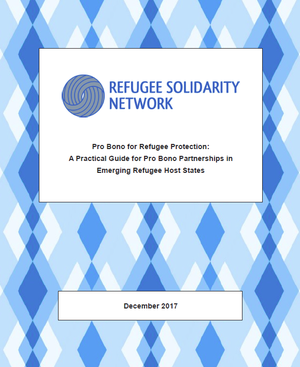Pro Bono for refugee protection: A practical guide for pro bono partnerships in emerging refugee host states

Introduction:
This paper analyzes the significance, history, structure, and workings of pro bono partnerships between NGOs working to protect and serve immigrants (refugees and other non-citizens) and for-profit lawyers and law firms in the United States. The paper seeks to provide an understanding of this arrangement and facilitate discussion on the viability of adopting this model in other states, particularly those hosting significant numbers of refugees.
The paper is intended for civil society operating in such states but more specifically legal practitioners, legal NGO workers, and other rights-based advocates that are involved, or interested in being involved in efforts to engage legal systems to protect this population, including by way of direct legal services and other strategic legal interventions. Therefore, the concept of pro bono legal services is already likely to be familiar to the reader.
In fact, pro bono partnerships already exist in many parts of the world, and several publications outline their basis and provide guidance for replication.8 However, this paper takes a unique approach in its context and intended use. The paper draws on the specific experience of the author organization, a US-based actor supporting programming in developing countries, particularly those that were traditionally viewed as “transit” countries but have increasingly become host states.
This paper presents pro bono partnerships in general and introductory terms, as a first step to bridge the US experience and that of developing states where emerging legal systems may be suitable to adapt US models. The paper is meant to provide a basis for understanding why such partnerships may be useful, how they can be perceived and marketed, and what the inner workings of such a partnership look like. RSN will continue to assess, in conjunction with partners, the particular characteristics of the local legal frameworks of interest, including the availability of resources, local legal rules and structure, that bear on the practical implementation of such partnerships. Forthcoming events and publications will address these elements of viability in more detail.
RSN’s exploration is in complement to other research, advocacy and capacity-building efforts focused on achieving well-funded and functioning state-funded legal aid schemes in all locations of interest. RSN recognizes the need for lawyers to be compensated for their time and efforts and therefore does not promote pro bono partnerships as the primary manner in which legal assistance can be offered to refugees. Similarly, RSN has begun undertaking research on mechanisms outside of traditional legal services which may be established or scaled up, specifically for the benefit of displaced populations in host states. This paper puts forth the starting point for legal aid NGOs and private attorneys in emerging legal systems to establish working relationships that will contribute to various efforts and projects that serve those most in need.
In sum, RSN will continue to take a multi-dimensional approach to helping ensure access to justice for displaced populations.